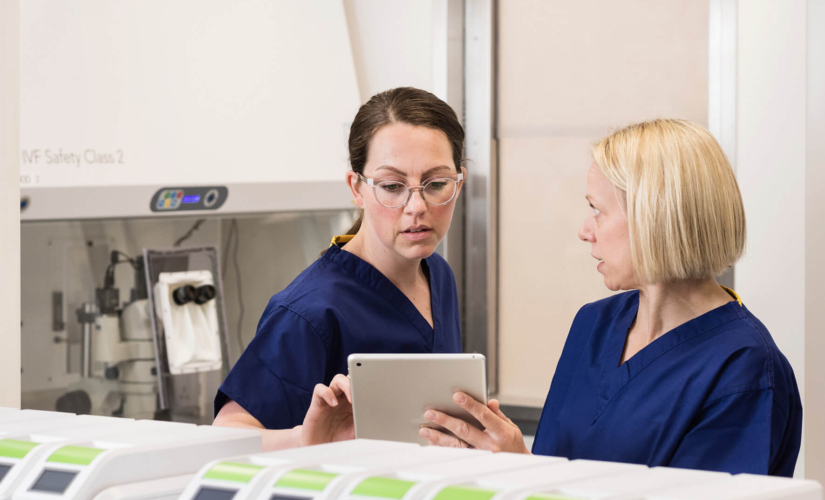How does coronavirus affect fertility and pregnancy?
This is a challenging time for everyone, there is a lot of anxiety and uncertainty around what is to come and things are changing every day. Dr Montse Amodeo helps to explain if Covid-19 affects fertility and pregnancy.
How does the COVID-19 vaccine affect fertility and pregnancy?
This is a challenging time for everyone, there is a lot of anxiety and uncertainty around what is to come and things are changing every day. Even under normal circumstances fertility and pregnancy can be a difficult time for some, so we appreciate that due to current events this time could pose as an even more stressful time.
Please read on for our guidance on how coronavirus affects fertility and pregnancy. We also want to let you know that we are here to support you in these difficult times. If you want to discuss anything further or have any other concerns, especially around fertility treatment, please don’t hesitate to give us a call on 020 3974 0950. Or if you would like to make an appointment to have an online consultation you can email appointments@evewell.com and we will get back to you.
What is coronavirus?
Coronavirus, SARS-COV-2, COVID-19 goes by many names and is a new strain of Coronavirus, which is a virus thought to have originated from Wuhan, China.
Symptoms include but are not limited to:
Fever, dry cough, sore throat and shortness of breath
Other symptoms such as loss of sense of taste have been recorded but not conclusively proven to be an official symptoms.
At The Evewell, we strongly support the government’s advice to stay at home to reduce the spread of coronavirus and reduce pressure on the NHS. Please ensure to check the United Kingdom Government website for guidance on coronavirus regularly and the NHS website for updated healthcare guidance.
Coronavirus and fertility
There is currently no conclusive evidence that coronavirus can and will affect fertility. However, illnesses that cause fevers can sometimes have an effect on lowering a number of eggs in females when doing an egg retrieval. In terms of male fertility, fevers that last for more than 3 days can impair sperm production for up to 6 months.
Painkillers used to treat high temperatures such as Ibuprofen or Naproxen are usually not recommended while trying to conceive, but an occasional dose is unlikely to make a huge impact.
How does coronavirus affect pregnancy?
Are pregnant women at a higher risk of contracting Coronavirus?
Pregnant women do not appear to be at higher risk at contracting the virus than the rest of the general population. However, the government has identified pregnant women as a vulnerable group, this means pregnant women should practice social distancing. This guidance has been put in place as a caution, as there is no evidence as of yet that Coronavirus affects pregnant women more severely.
What we do know, is that pregnancy can alter how the body handles severe viral infections, something that midwives and doctors have known for years. As pregnancy alters the body’s immune system and response to viral affections, this could possibly mean it may affect the response to Coronavirus, especially towards the end of pregnancy.
Currently, there is no evidence that pregnant women are at higher risk of severe disease, however, if you do have an underlying health condition related to respiratory disease, cardiovascular diseases, kidney disease or liver disease you will be more at risk, and pregnancy may compound this.
Currently, there have been no reported deaths in pregnant women, there have been reported cases of pneumonia and pregnancy – which have been mild and reported to have made a good recovery.
As this is a new disease we are constantly finding out new information about it, please check the Royal College of Obstetricians & Gynaecologists for the most up-to-date information.
Can transmission occur between mother and baby?
There has been some emerging evidence that suggests that transmission of the virus between mother and baby (called vertical transmission) is possible, however again as there has been such little cases in pregnant women, there is no conclusive evidence on this.
There is also currently nothing to suggest that pregnant women are at higher risk of miscarriage or birth defects due to coronavirus. However, high fever during the first trimester may be linked to increase risk of early loss and some malformations on the foetus. If you have a high temperature, please don’t worry and contact your doctor or midwife regarding safe medication during pregnancy to lower your temperature.
Getting pregnant
Currently, there is no recommendation to stop trying to get pregnant. This is because pregnant women are not at higher risk of miscarriage and the virus doesn’t seem to cause any malformation in babies. However, this is of course an entirely personal decision which will be dependent on your circumstances.
This is a stressful time for everyone, read our advice on stress and fertility here.





